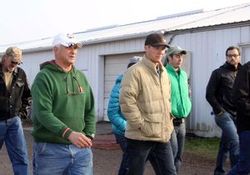LaCrosse Tribune | 5. Feb 2014
The smokescreen of foreign ownership of farmland
Jim Massey's commentary, "Foreign Ownership Needs Proper Vetting,” of Jan. 29, alerted readers to the resurrected concern about foreigners acquiring Wisconsin farmland. The legislature has requested the Attorney General to opine on such according to Wisconsin and international law and treaties negotiated between the US and other countries.
The xenophobia over foreign investors — individual, corporate or parastatal — fosters heightened interest in prohibiting foreign acquisition of more than 640 acres of farmland.
Many politicians and their corporate backers intentionally manipulate this xenophobia for myopic objectives. Clearly, the Walker administration and many Republican politicians, though, are advancing this legislation, not because of fear of suit under certain U.S. treaties on trade and investment (multilateral under GATT, GATS or WTO, or bilateral), but because of their financial support from multinational corporations, Wisconsin realtors, and their hope for enticing foreign investment.
This issue, however, is nothing more than a smokescreen and distraction from the principal problem related to farmland ownership. We as farmers should be advocating for greater ownership of farmland by the actual operators (farmers) of that land. Further, we should seek to deter ownership of farmland by institutional investors, not only foreign, but also U.S. domestic.
Institutional investors comprise such groups as hedge funds, pension funds, insurance companies, asset managers, commercial and investment banks, sovereign wealth funds, and ultra-wealthy individuals who have the ability to assess and execute their own investment decisions independently. It makes no difference whether these investors are foreign or domestic. They all operate more or less similarly. Their thinking and management are fundamentally and virtually the same. Further, foreign investors execute their investments in farmland indirectly through their U.S. subsidiaries or affiliates, which legally makes the investment a domestic investment, not a foreign one.
In the past decade, institutional investors have been acquiring U.S. farmland at a rapid pace. UBS (Union Bank of Switzerland), for example, acquired a farm management and acquisition fund through the purchase of a Connecticut insurance subsidiary. U.S. pension funds, both public and private, insurance companies, and wealthy investors among others have been gobbling up U.S. farmland, particularly since the start of the Great Recession in 2007 and because they could not generate their customary returns in traditional domestic and international investing. Agribusinesses too, seeking to solidify their vertical integration, have also been advancing U.S. and foreign farmland acquisition.
Opposition to corporate ownership, however, necessarily should exclude S-corporations or family-owned corporations who either farm the land or, through estates of deceased farmers, lease out the land.
As middle-income countries acquire more wealth and as the world population grows while facing the ramifications of global warming, the demand for more food and for higher protein food is forecasted to rise. This is driving the rising demand for productive, arable land, particularly from countries lacking resources for self-sufficient food production and for corporations (domestic or foreign) seeking to capture the forecasted profits to arise from agriculture.
We as farmers wish to determine our own destiny as owner-operators, not as tenants. Thus, let us focus on the real issue that our legislators should be grasping-how do we keep farmers operating and attract farmers to own the land they work, and not become peasants on land rented from institutional investors, domestic or foreign. Let us not get distracted by the smokescreen of foreign ownership, but grasp the complexity of the more fundamental issue.
Slattery, of Maribel, is district director of Wisconsin Farmers Union.













